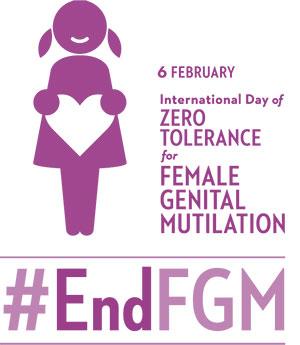
From: http://www.un.org/en/events/femalegenitalmutilationday/background.shtml
Female genital mutilation (FGM) comprises all procedures that involve altering or injuring the female genitalia for non-medical reasons and is recognized internationally as a violation of the human rights of girls and women.
Background
FGM is recognized internationally as a violation of the human rights of girls and women. It reflects deep-rooted inequality between the sexes, and constitutes an extreme form of discrimination against women. It is nearly always carried out on minors and is a violation of the rights of children.
The practice also violates a person's rights to health, security and physical integrity, the right to be free from torture and cruel, inhuman or degrading treatment, and the right to life when the procedure results in death.
Although primarily concentrated in 29 countries in Africa and the Middle East, FGM is a universal problem and is also practiced in some countries in Asia and Latin America. FGM continues to persist amongst immigrant populations living in Western Europe, North America, Australia and New Zealand.
Though the practice has persisted for over a thousand years, programmatic evidence suggests that FGM/C can end in one generation. UNFPA, jointly with UNICEF, leads the largest global programme to accelerate the abandonment of FGM. The programme currently focuses on 17 African countries and also supports regional and global initiatives.
On 20 December 2012, the UN General Assembly adopted Resolution A/RES/67/146 in which it
“Calls uponStates, the United Nations system, civil society and all stakeholders to continue to observe 6 February as the International Day of Zero Tolerance for Female Genital Mutilation and to use the day to enhance awareness- raising campaigns and to take concrete actions against female genital mutilations”.
In December 2014, the UN General Assembly adopted without a vote Resolution A/RES/69/150 “Intensifying global efforts for the elimination of female genital mutilations”, callling upon member States to develop, support and implement comprehensive and integrated strategies for the prevention of FGM including training of medical personnel, social workers and community and religious leaders to ensure they provide competent, supportive services and care to women and girls who are at risk of or who have undergone FGM. The resolution also acknowledges that intensifying efforts for the elimination of FGM is needed, and in this regard, the importance of giving the issue due consideration in the elaboration of the post-2015 development agenda
It reflects deep-rooted inequality between the sexes, and constitutes an extreme form of discrimination against women and girls. The practice also violates their rights to health, security and physical integrity, their right to be free from torture and cruel, inhuman or degrading treatment, and their right to life when the procedure results in death.
To promote the abandonment of FGM, coordinated and systematic efforts are needed, and they must engage whole communities and focus on human rights and gender equality. These efforts should emphasize societal dialogue and the empowerment of communities to act collectively to end the practice. They must also address the sexual and reproductive health needs of women and girls who suffer from its consequences.
UNFPA, jointly with UNICEF, leads the largest global programme to accelerate the abandonment of FGM. The programme currently focuses on 17 African countries and also supports regional and global initiatives.
This Day also falls under the ongoing Spotlight Initiative, a joint project of the European Union and the United Nations to eliminate all forms of violence against women and girls. One of the specific threads of the Spotlight Initiative targets sexual and gender-based violence, and harmful practices in Sub-Saharan Africa, which include female genital mutilation.
Key Facts:
- Globally, it is estimated that at least 200 million girls and women alive today have undergone some form of FGM.
- Girls 14 and younger represent 44 million of those who have been cut, with the highest prevalence of FGM among this age in Gambia at 56 per cent, Mauritania 54 per cent and Indonesia where around half of girls aged 11 and younger have undergone the practice.
- Countries with the highest prevalence among girls and women aged 15 to 49 are Somalia 98 per cent, Guinea 97 per cent and Djibouti 93 per cent.
- FGM is mostly carried out on young girls sometime between infancy and age 15.
- FGM cause severe bleeding and health issues including cysts, infections, infertility as well as complications in childbirth increased risk of newborn deaths.
- FGM is a violation of the human rights of girls and women.
- The Sustainable Development Goals in 2015 calls for an end to FGM by 2030 under Goal 5 on Gender Equality, Target 5.3 Eliminate all harmful practices, such as child, early and forced marriage and female genital mutilation.
- The elimination of FGM has been called for by numerous inter-governmental organizations, including the African Union, the European Union and the Organization of Islamic Cooperation, as well as in three resolutions of the United Nations General Assembly.











Add new comment